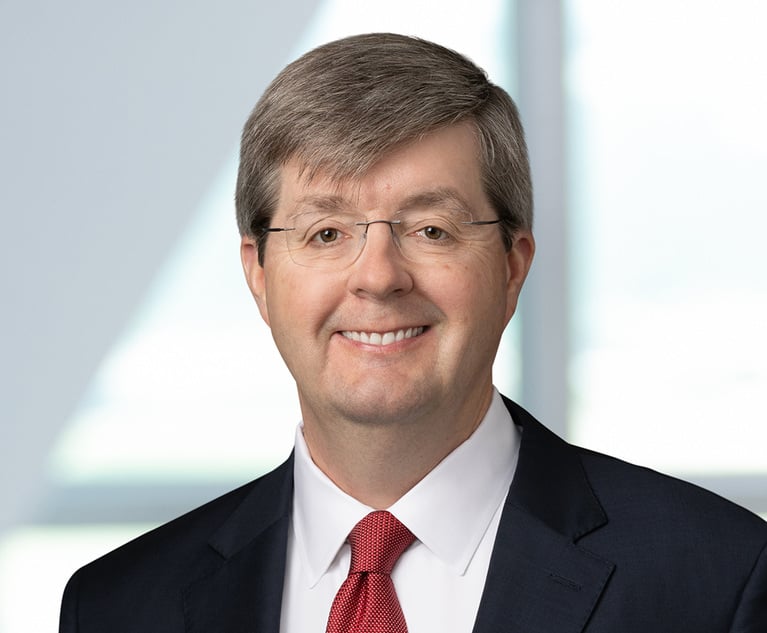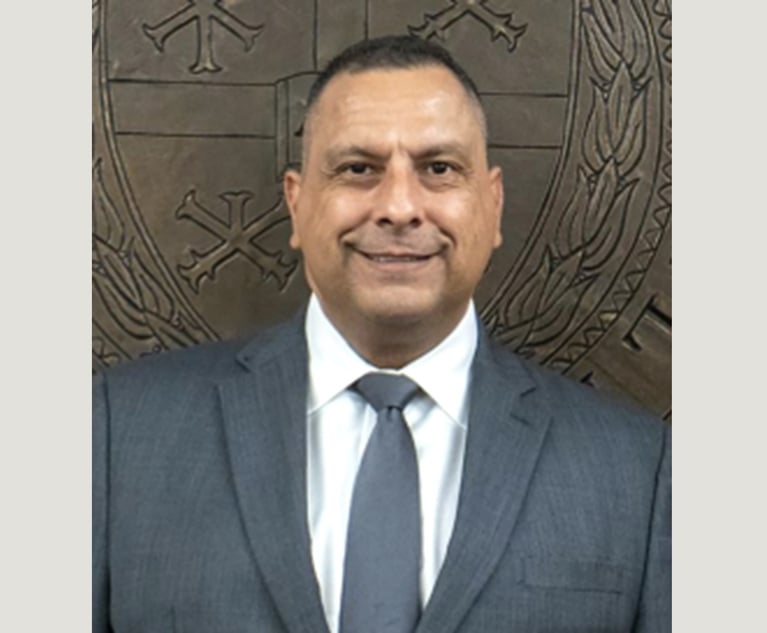The Boomerang Effect: You Can Go Home Again
In highly competitive markets with intense lateral movement, it is not unusual to see lawyers move from one law firm to another, only to return to their former firm after a few years.
December 06, 2018 at 03:34 PM
7 minute read
The original version of this story was published on The American Lawyer

Richard Frye, an attorney who specializes in private equity work, practiced at Weil, Gotshal & Manges for 10 years before leaving for Winston & Strawn in March of 2017. This month, Frye rejoined Weil—an example of the growing frequency of the boomerang effect occurring in the legal world.
The phenomenon of attorneys leaving and later returning to their former firm is not exactly new. Lawyers have long been known to move in-house or take a government post for a few years and then go back to their former firm. But now, especially in highly competitive markets with intense lateral movement, it is not unusual to see lawyers move from one law firm to another, only to return to their former firm after a few years.
Kent Zimmermann, a law firm consultant with Zeughauser Group, said that with the current lateral market inflamed nationally by Am Law 200 firms opening branch offices all over the country, more lawyers will be enticed to move but in time will return to their former firm. And in places like Texas, where the competition for talent and has been intense, such boomerang activity could soar.
“The competitive environment to recruit is tighter in Texas than in many other geographic areas,” Zimmermann said. “And that may result in increased boomerang activity.”
|There's No Place Like Home
 Mariah McGrogan
Mariah McGrogan
Mariah McGrogan had been a labor and employment attorney with Reed Smith in Pittsburgh for two years when she left to join the employment firm Jackson Lewis in August 2016. She said she enjoyed her two years at Jackson Lewis and learned a great deal about employment issues and litigation.
But she had built some very strong mentoring relationships while at Reed Smith and missed the lawyers, she said. So, when Reed Smith had an opening for a labor and employment lawyer in its Pittsburgh office earlier this year, McGrogan said “it tugged on my heartstrings.” She called a friend at the firm, and very quickly was hired back.
Some lawyers wait much longer to go home again. In February, when the lateral market in Texas had gotten especially hot, Joe Wielebinski returned to Winstead as a partner in Dallas after spending 33 years at Munsch Hardt—a firm founded by a group of former Winstead lawyers in 1985.
Wielebinski, a bankruptcy lawyer, said it made sense for him to return to Winstead because of the depth of the firm's insolvency practice and financial institutions practice. He moved back with Walter Buchanan and Paul Seiler, who also boomeranged after 28 years at other firms. Wielebinski said multiple firms had approached him prior to his move, but nothing sounded interesting or worth pursuing until Winstead reached out.
“They really rolled out the red carpet,” Wielebinski said. ”It was a very comfortable feeling, coming home.”
Winstead also lost some lawyers this year as the boomerang phenomenon took hold in Texas. Four energy litigators who had joined Winstead from K&L Gates in 2011 returned to K&L Gates in March.
“There's something to coming back,” said Lisa Smith, a principal with legal consultant Fairfax Associates in Washington, D.C. “You know people and are comfortable. You don't have to prove yourself at every turn.”
Not all boomerangs move from law firm to law firm, of course. It's commonplace for lawyers to go into government service and then return to their former firm, Smith said. And lawyers frequently leave firms for in-house jobs and then return.
“It's so common. It's just the nature of the industry,” said Chris Batz, a legal recruiter and founder of the legal recruiting firm The Lion Group.
|Everyone Benefits
When those lawyers do return, they not only have insights that can benefit their firm, but they also value the firm that much more.
“I gained a much better appreciation of the positive aspects of being in a law firm,” said William “Chip” Cavanaugh Jr., a Munsch Hardt Kopf & Harr partner in Dallas who returned to the firm after a stint as a principal in a private equity firm.
Some lawyers even try a few different positions before boomeranging to their former firms. In September, for example, M&A lawyer Christina Marshall returned to Haynes and Boone as a partner in Dallas after spending a few years as general counsel for a Dallas company and then managing her own small firm.
Marshall said she learned a lot about the client's perspective while working in-house and also about firm management as an owner of her firm. But when Haynes and Boone asked her to consider returning, she jumped at the chance.
Neal Rackleff left Locke Lord twice for government jobs—once as director of housing and community development for the city of Houston, and then as an assistant secretary for the U.S. Department of Housing and Urban Development. He returned to the firm both times.
Austin Lee, a partner at Bracewell in Houston, was a fifth-year associate when he left the firm in 2014 to take an in-house position at Newfield Exploration. He returned to Bracewell a year later. He missed the “pace and timeline” of a firm, he said. So he started talking to Bracewell about a potential return and the firm took him back.
But Lee was not Bracewell's first boomerang. Shortly after joining the firm as chief talent officer in 2017, Jennifer Queen looked at hiring data and noticed that a large number of lawyers who had left the firm had returned. In fact, she said that since 2015, 14 lawyers had boomeranged back to Bracewell.
According to Queen, the boomerang phenomenon is most common among associates, which she attributes that to the millennial factor. Those younger lawyers, now the industry's largest demographic, are more open to changing jobs, she said.
|To Government and Back
Lawyers who leave a firm for government service are often highly sought-after when they  decide to return to firm practice. Kim Koopersmith, chair of Akin Gump Strauss Hauer & Feld, said it's a “wonderful thing” for a firm to have lawyers leave to take a job in government and then return.
decide to return to firm practice. Kim Koopersmith, chair of Akin Gump Strauss Hauer & Feld, said it's a “wonderful thing” for a firm to have lawyers leave to take a job in government and then return.
“From our point of view, it's a plus,” she said. “We are happy when people go forth and happy when people return.”
Robert Allen was an associate at Kirkland & Ellis in Washington, D.C., from 2011 through 2014, but left to become a prosecutor at the U.S. Attorney's Office for the Southern District of New York. He enjoyed being a prosecutor, but he said he knew he would one day return to private practice.
This year, he returned to Kirkland.
He never considered going anywhere else, he said.
Further Reading:
This content has been archived. It is available through our partners, LexisNexis® and Bloomberg Law.
To view this content, please continue to their sites.
Not a Lexis Subscriber?
Subscribe Now
Not a Bloomberg Law Subscriber?
Subscribe Now
NOT FOR REPRINT
© 2025 ALM Global, LLC, All Rights Reserved. Request academic re-use from www.copyright.com. All other uses, submit a request to [email protected]. For more information visit Asset & Logo Licensing.
You Might Like
View All
Bracewell Adds Former Pioneer Natural Resources Lawyer to O&G, Energy Transition Practices
2 minute read

Special Counsel Jack Smith Prepares Final Report as Trump Opposes Its Release
4 minute readTrending Stories
Who Got The Work
Michael G. Bongiorno, Andrew Scott Dulberg and Elizabeth E. Driscoll from Wilmer Cutler Pickering Hale and Dorr have stepped in to represent Symbotic Inc., an A.I.-enabled technology platform that focuses on increasing supply chain efficiency, and other defendants in a pending shareholder derivative lawsuit. The case, filed Oct. 2 in Massachusetts District Court by the Brown Law Firm on behalf of Stephen Austen, accuses certain officers and directors of misleading investors in regard to Symbotic's potential for margin growth by failing to disclose that the company was not equipped to timely deploy its systems or manage expenses through project delays. The case, assigned to U.S. District Judge Nathaniel M. Gorton, is 1:24-cv-12522, Austen v. Cohen et al.
Who Got The Work
Edmund Polubinski and Marie Killmond of Davis Polk & Wardwell have entered appearances for data platform software development company MongoDB and other defendants in a pending shareholder derivative lawsuit. The action, filed Oct. 7 in New York Southern District Court by the Brown Law Firm, accuses the company's directors and/or officers of falsely expressing confidence in the company’s restructuring of its sales incentive plan and downplaying the severity of decreases in its upfront commitments. The case is 1:24-cv-07594, Roy v. Ittycheria et al.
Who Got The Work
Amy O. Bruchs and Kurt F. Ellison of Michael Best & Friedrich have entered appearances for Epic Systems Corp. in a pending employment discrimination lawsuit. The suit was filed Sept. 7 in Wisconsin Western District Court by Levine Eisberner LLC and Siri & Glimstad on behalf of a project manager who claims that he was wrongfully terminated after applying for a religious exemption to the defendant's COVID-19 vaccine mandate. The case, assigned to U.S. Magistrate Judge Anita Marie Boor, is 3:24-cv-00630, Secker, Nathan v. Epic Systems Corporation.
Who Got The Work
David X. Sullivan, Thomas J. Finn and Gregory A. Hall from McCarter & English have entered appearances for Sunrun Installation Services in a pending civil rights lawsuit. The complaint was filed Sept. 4 in Connecticut District Court by attorney Robert M. Berke on behalf of former employee George Edward Steins, who was arrested and charged with employing an unregistered home improvement salesperson. The complaint alleges that had Sunrun informed the Connecticut Department of Consumer Protection that the plaintiff's employment had ended in 2017 and that he no longer held Sunrun's home improvement contractor license, he would not have been hit with charges, which were dismissed in May 2024. The case, assigned to U.S. District Judge Jeffrey A. Meyer, is 3:24-cv-01423, Steins v. Sunrun, Inc. et al.
Who Got The Work
Greenberg Traurig shareholder Joshua L. Raskin has entered an appearance for boohoo.com UK Ltd. in a pending patent infringement lawsuit. The suit, filed Sept. 3 in Texas Eastern District Court by Rozier Hardt McDonough on behalf of Alto Dynamics, asserts five patents related to an online shopping platform. The case, assigned to U.S. District Judge Rodney Gilstrap, is 2:24-cv-00719, Alto Dynamics, LLC v. boohoo.com UK Limited.
Featured Firms
Law Offices of Gary Martin Hays & Associates, P.C.
(470) 294-1674
Law Offices of Mark E. Salomone
(857) 444-6468
Smith & Hassler
(713) 739-1250







